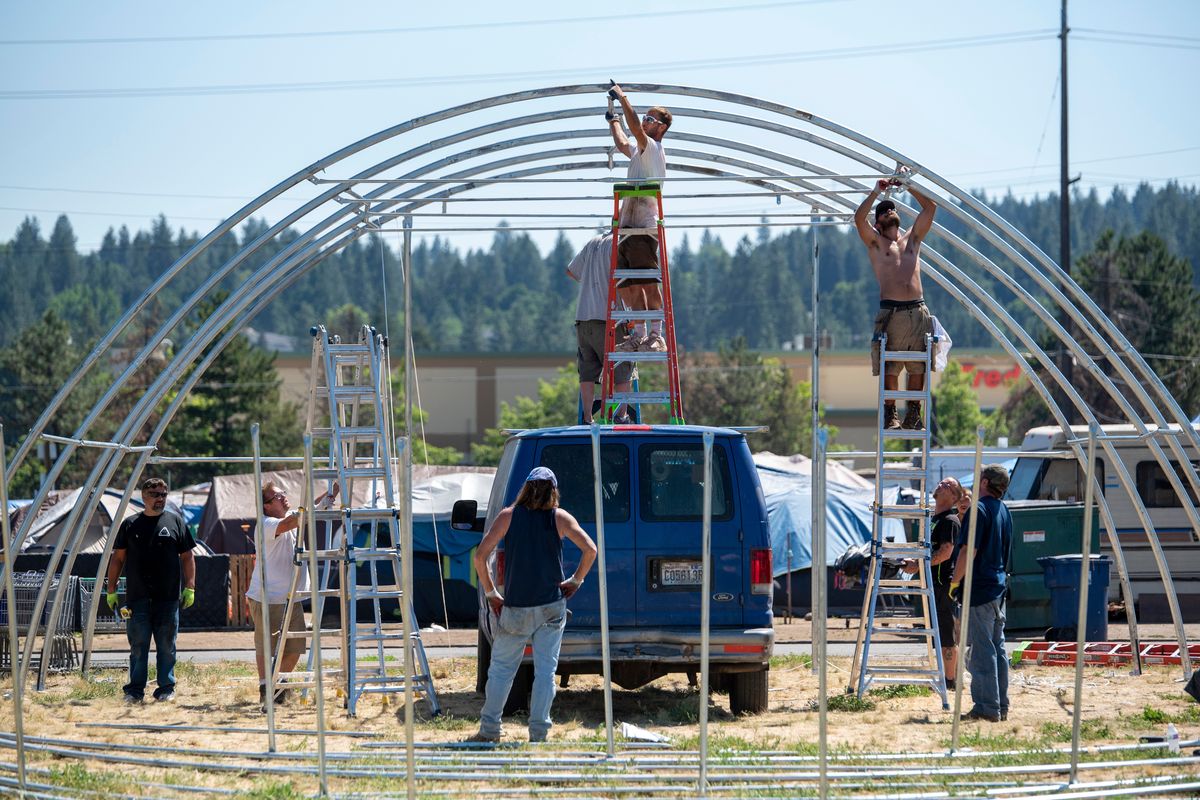‘We’re doing what we can’: Spokane homeless camp builds cooling tent to keep safe during expected heatwave

By early Tuesday afternoon, people at the homeless encampment on East Second Avenue and Ray Street in Spokane were building the frame of a large tent designed as a cooling shelter for the hundreds living there.
The tent, like the encampment, is located on land owned by the Washington state Department of Transportation. And while WSDOT is not officially permitting it, the state doesn’t plan to do anything to stop it, given this week’s temperature outlook.
Temperatures are expected to top 100 degrees this week, prompting the National Weather Service to issue an excessive heat warning for the area until 11 p.m. Saturday.
Known as Camp Hope, the encampment has upwards of 600 people living out of tents and vehicles on a plot of land near Interstate 90.
Jewels Helping Hands organized a crew to construct the tent on the other side of East Pacific Avenue, on another WSDOT lot. The tent, large enough for 200 people, will offer fans, misters and shade to keep Camp Hope residents cool into next week, said Executive Director Julie Garcia.
Jewels informed WSDOT on Tuesday morning about the tent, which the nonprofit will run for 12 hours per day exclusively for the inhabitants of Camp Hope. In an email to the Department of Transportation, Garcia said no overnight sleeping or camping in or around the tent will be allowed.
“This direct sun is what kills you,” Garcia said. “In the shade, at least it’s somewhat manageable, but we don’t have enough shade for all of these folks.
Officially, WSDOT is not allowing for the tent to be there just as they are not permitting Camp Hope’s existence, said Joe McHale, communications consultant with the WSDOT Eastern Region.
Still, the state has thus far allowed campers to stay on the site since Spokane does not have enough shelter beds.
With the temperatures the way they are, meanwhile, McHale said WSDOT officials will not stop the cooling tent if that’s what it will take to keep those living in the encampment safe. Even if they did, WSDOT has relied on local law enforcement or code enforcement to address any illegal activity.
“While we don’t want to permit illegal activity, we also realize we want to be humane about the whole situation,” McHale said. “We don’t want the camp there, but we’re not going to stop Jewels from implementing life-saving measures. We don’t want anyone to die on our property.”
Through Saturday, hours are expanded at four libraries that will serve as cooling centers. Other organizations, including the Salvation Army’s Family Resource Center on East Indiana Avenue, are also hosting cooling facilities.
The closest library to the encampment, Liberty Park, is around 1 mile away. The Spokane Transit Authority has said folks who cannot afford bus fare can tell the operator what cooling center they’re headed to for a free ride – specifically, when the day is forecast to be 95 or above, users heading to or leaving from cooling centers can ask for a fare exception.
That was not directly expressed to the camp’s inhabitants or Jewels Helping Hands, the nonprofit overseeing the camp, Garcia said.
“If you’re going to set things up for people experiencing homelessness, why are we announcing it on the news? Why are we not telling the service providers?” Garcia said.
The tent will cost Jewels approximately $21,000 to run over the next 10 days between staffing, security, equipment, setup and teardown.
The nonprofit Empire Health Foundation has stepped up to provide the funding needed for the tent. Empire Health President Zeke Smith said the funding comes from the president’s discretionary fund, meaning it’s something he feels is aligned with the organization’s mission, but may not necessarily be tied with any other of the group’s funded initiatives.
Smith, concerned with temperatures beyond just this week, said he hopes to see more local government and community support for the homeless, especially in light of the 20 heat-related deaths across Spokane County during last year’s heat wave.
“It felt like, given the heat that’s coming, we’ve got to do something,” Smith said. “I had some conversations with folks at the city to see if they consider where folks are and try to do something about it, and was not hearing or seeing that that would be possible. I had conversations with Julie Garcia, who indicated they had a tent and they could get it set up. I asked for a budget.”
Garcia said, “We were going to try to do it without this tent because we didn’t have the funding and people were passing out in their tents last night because of heat exhaustion. We knew we had to do something. Zeke said he would try to do everything he can.”
While Jewels has two tents, Garcia said the nonprofit only has the funding at the moment to staff and operate one.
And while the nonprofit has received support from the community in the form of ice, water, Gatorade and other supplies, Garcia said Jewels could always use more.
“We’re doing what we can, but … Everything that comes into Jewels, this camp is eating it away,” Garcia said. “It would be really nice if people could start writing some checks.”
“It’s only going to progressively get worse this week because it’s been hot all week and the heat builds up in there,” she said. “Come Thursday and Friday, those tents aren’t even going to be livable.”
Editor’s note: This story was updated Wednesday, July 27 with more specific information about the fare waivers offered by the Spokane Transit Authority.